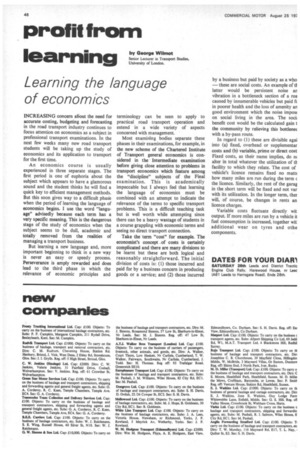profit from learning
Page 48

If you've noticed an error in this article please click here to report it so we can fix it.
Learning the language of economics
by George Wilmot
Senior Lecturer in Transport Studies. University of London.
INCREASING concern about the need for accurate costing, budgeting and forecasting in the road transport industry continues to focus attention on economics as a subject in professional transport examinations. In the next few weeks many new road transport students will be taking up the study of economics and its application to transport for the first time.
An economics course is usually experienced in three separate stages. The first period is one of euphoria about the subject which appears to have a glamorous sound and the student thinks he will find a quick key to efficient management methods. But this soon gives way to a difficult phase when the period of learning the language of economics begins. I use the word "language" advisedly because each term has a very specific meaning. This is the dangerous stage of the study of economics when the subject seems to be dull, academic and totally removed from the realities of managing a transport business.
But learning a new language and, more important beginning to think in a new way is never an easy or speedy process. Perseverance is amply rewarded and does lead to the third phase in which the relevance of economic principles and terminology can be seen to apply to practical road transport operation and extend in a wide variety of aspects concerned with management.
Most examining bodies separate these phases in their examinations, for example, in the new scheme of the Chartered Institute of Transport general economics is considered in the' Intermediate examination before giving close attention to problems in transport economics which feature among the "discipline" subjects of the Final examination. This is academically impeccable but I always feel that learning the language of economics must be combined with an attempt to indicate the relevance of the terms to specific transport problems. This is a difficult teaching task but is well worth while attempting since there can be a heavy wastage of students in a course grappling with economic terms and seeing no direct transport connection.
Take the term "cost" for example. The economist's concept . of costs is certainly complicated and there are many divisions to be learnt but these are both logical and reasonably straightforward. The initial division of costs is: (1) those incurred and paid for by a business concern in producing goods or a service; and (2) those incurred by a business but paid by society as a who — these are social costs. An example of ti latter would be persistent noise an vibration in a bottleneck section of a roa caused by innumerable vehicles but paid ft in poorer health and the loss of amenity an good environment which the noise impost on social living in the area. The sociA benefit cost would be the calculated gain t the community by relieving this bottlenec with a by-pass route.
In regard to (1) these are divisible agai into (a) fixed, overhead or supplementar costs and (b) variable, prime or direct cost Fixed costs, as their name implies, do n( alter in total whatever the utilization of th facility to which they relate. The cost of vehicle's licence remains fixed no matt( how many miles are run during the term c the licence. Similarly, the rent of the garag in the short term will be fixed and not var with its utilization. In the longer term, ther will, of course, be changes in rents an licence charges.
Variable costs fluctuate directly wit output. If more miles are run by a vehicle it fuel consumption is increased, together wit additional wear on tyres and othe components.
DATES FOR YOUR DIAR)
SATURDAY 26th Leeds and District Tractio Engine Club Rally, Harewood House, nr Le& (A61 Leeds to Harrogate Road) Ends 28th.




















































































